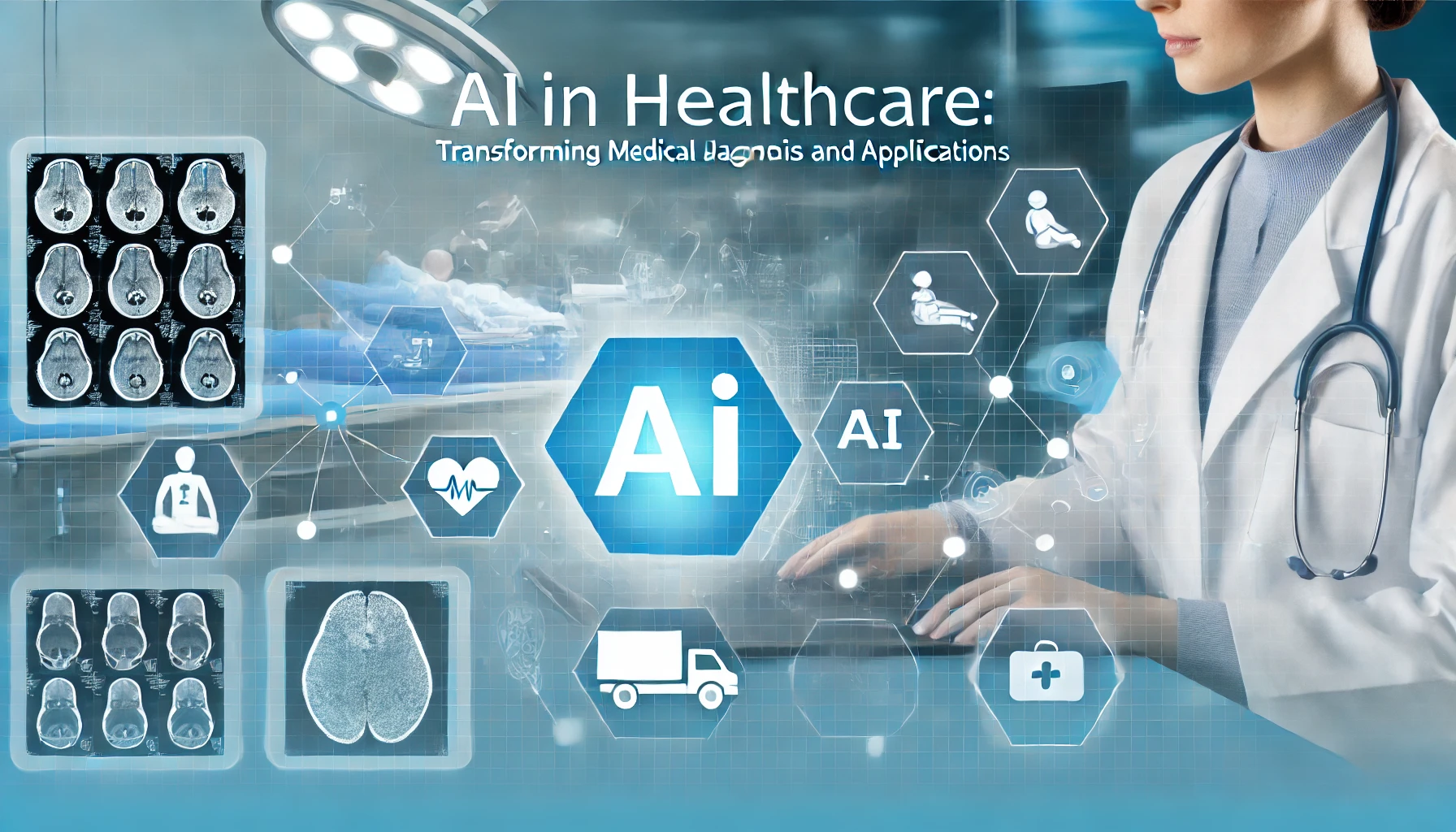AI in Healthcare: Transforming Medical Diagnosis and Applications
Artificial Intelligence (AI) in healthcare is not just a futuristic concept but a present-day reality that is transforming the medical field. From improving medical diagnosis to enhancing healthcare applications, AI is playing a crucial role in revolutionizing the healthcare industry. This comprehensive guide will explore the various aspects of AI in healthcare, focusing on its applications, industry impact, benefits, challenges, and ongoing research.
What is AI in Healthcare?
AI in Healthcare: An Overview
Artificial Intelligence (AI) in healthcare refers to the use of complex algorithms and software to emulate human cognition in the analysis, interpretation, and comprehension of complicated medical and healthcare data. AI is revolutionizing how healthcare providers process information, make decisions, and deliver care.
- Machine Learning: A subset of AI, it uses statistical techniques to enable machines to improve with experience. Machine learning algorithms can predict outcomes based on historical data.
- Natural Language Processing (NLP): This involves the interaction between computers and humans using natural language. In healthcare, NLP is used to analyze unstructured clinical notes on patients, giving insights into quality, improving methods, and achieving better outcomes.
- Robotics: AI-powered robots are used for surgery, rehabilitation, and providing companionship to the elderly.
AI Healthcare Applications
AI applications in healthcare are vast and diverse, ranging from administrative automation to sophisticated clinical applications. Key areas include:
- Patient Care and Management: AI tools can monitor patients’ vital signs, alerting healthcare providers to any abnormalities. For example, wearable devices with AI algorithms can detect irregular heartbeats.
- Medical Imaging and Diagnostics: AI systems can analyze medical images (such as X-rays, CT scans, and MRIs) to identify patterns that human eyes might miss, leading to early and accurate diagnoses.
- Personalized Medicine: AI helps in tailoring treatments to individual patients based on their genetic makeup and other personal factors. This approach enhances the effectiveness of treatments and minimizes adverse effects.
- Drug Discovery: AI accelerates the process of drug discovery by analyzing vast amounts of data to predict which drug formulations might be most effective for treating specific diseases.
AI in Medical Diagnosis
AI in medical diagnosis is perhaps one of the most exciting applications. AI-powered diagnostic tools analyze vast amounts of medical data to assist doctors in diagnosing diseases more accurately and swiftly.
- Cancer Detection: AI algorithms can analyze mammograms and other cancer screening images to detect tumors earlier than traditional methods.
- Cardiovascular Diseases: AI systems can predict heart diseases by analyzing patient data, including EKG readings and historical health records.
- Neurological Disorders: AI can help diagnose conditions like Alzheimer’s and Parkinson’s by analyzing brain scans and identifying early signs of these diseases.
Industry Insights and Trends
AI in Healthcare Industry
The integration of AI in the healthcare industry has led to significant advancements, particularly in efficiency and accuracy. Hospitals and clinics are increasingly adopting AI technologies to streamline operations and improve patient outcomes.
- Operational Efficiency: AI helps in optimizing hospital operations, from managing patient flow to automating administrative tasks.
- Predictive Analytics: Healthcare providers use AI to predict patient admissions, improve staffing, and manage resources more effectively.
- Telemedicine: AI enhances telemedicine services by providing real-time analysis of patient data, enabling remote diagnostics and consultations.
AI in Healthcare 2024
In 2024, the use of AI in healthcare is expected to grow even further, driven by advancements in technology and increased adoption by healthcare providers. Key trends include:
- Enhanced Data Security: AI algorithms are being developed to enhance the security of patient data, ensuring privacy and compliance with regulations.
- Integration with IoT: AI systems are increasingly being integrated with Internet of Things (IoT) devices, enabling continuous monitoring and real-time analysis of patient data.
- AI in Healthcare Companies: Leading companies like IBM, Google, and Microsoft are investing heavily in AI healthcare solutions, developing new tools and technologies to support healthcare providers.
Benefits and Challenges
AI in Healthcare Benefits
The benefits of AI in healthcare are numerous and impactful, leading to improved patient outcomes, reduced costs, and enhanced efficiency.
- Early Detection and Diagnosis: AI enables the early detection of diseases, improving the chances of successful treatment.
- Personalized Treatment Plans: AI helps in creating personalized treatment plans based on individual patient data, leading to better outcomes.
- Reduced Operational Costs: Automating administrative tasks and optimizing operations reduce costs and improve efficiency.
- Enhanced Patient Experience: AI-powered tools and applications enhance patient care and experience, making healthcare more accessible and effective.
AI in Healthcare Challenges
Despite its potential, the adoption of AI in healthcare faces several challenges that need to be addressed.
- Data Privacy and Security: Ensuring the privacy and security of patient data is a significant concern, given the sensitive nature of health information.
- Regulatory Compliance: Compliance with healthcare regulations and standards is essential for the adoption of AI technologies.
- Integration with Existing Systems: Integrating AI solutions with existing healthcare systems can be complex and costly.
- Ethical Considerations: The use of AI in healthcare raises ethical questions, particularly concerning decision-making and patient consent.
Innovation and Research
AI in Healthcare Startups
Numerous startups are at the forefront of AI innovation in healthcare, developing cutting-edge solutions to address various healthcare challenges.
- AI in Diagnostics: Startups are developing AI-powered diagnostic tools that can analyze medical images and patient data to detect diseases early.
- AI in Drug Development: Companies are using AI to accelerate drug discovery and development, reducing the time and cost associated with bringing new drugs to market.
- AI in Patient Care: Startups are creating AI-powered applications to monitor patients’ health in real-time, providing alerts and recommendations to healthcare providers.
AI in Healthcare Research
Research in AI for healthcare is ongoing, with scientists and researchers exploring new ways to leverage AI technologies to improve healthcare delivery and outcomes.
- AI Algorithms for Disease Prediction: Researchers are developing AI algorithms to predict the onset of diseases based on patient data, enabling preventive care.
- AI in Genomics: AI is being used to analyze genetic data, leading to a better understanding of genetic disorders and the development of personalized treatments.
- AI in Public Health: AI tools are being used to analyze public health data, helping to track disease outbreaks and develop strategies to combat them.
Artificial Intelligence (AI) in healthcare is transforming the medical field by improving diagnosis, enhancing applications, and driving innovation. From AI healthcare applications and industry impact to the benefits, challenges, and ongoing research, AI is set to revolutionize healthcare in numerous ways. By staying updated with the latest trends and advancements, healthcare providers can leverage AI to deliver better care and improve patient outcomes.
For more information on AI in healthcare and related courses, visit Regent Studies. Explore how AI in healthcare, medical diagnosis, and healthcare applications are shaping the future of medicine and enhancing patient care. Stay ahead in the rapidly evolving field of healthcare with AI.
For further reading and a deeper understanding of AI in healthcare, consider exploring resources from leading healthcare organizations and companies. Embrace the potential of AI to revolutionize healthcare and improve the quality of life for patients worldwide.
References:




